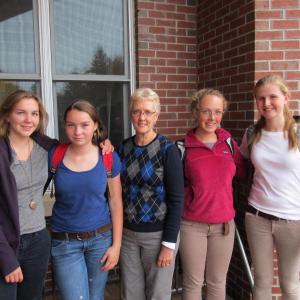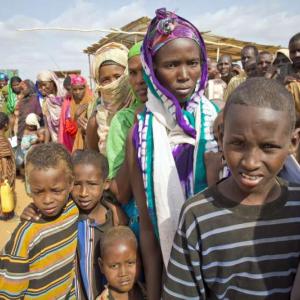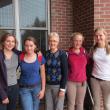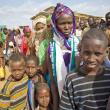High school students work to reunite 13-year-old Somali boy with mother
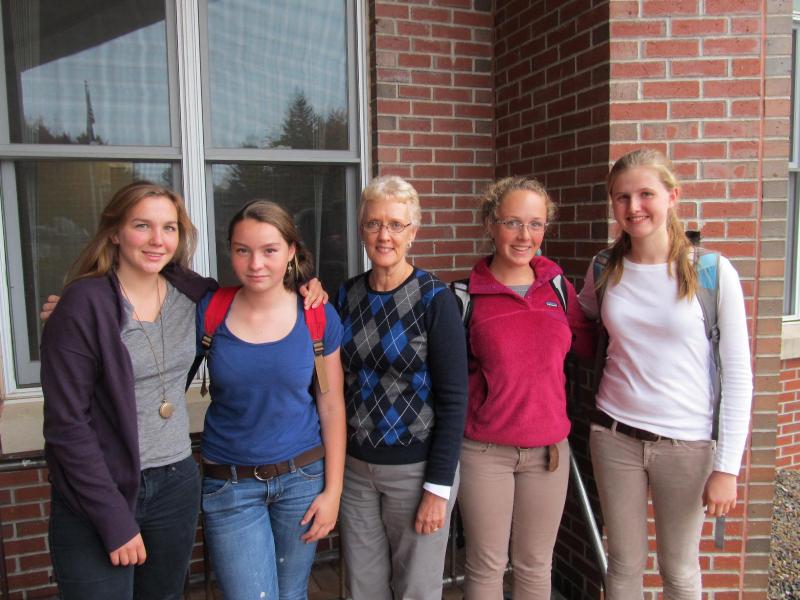 Audrey Lane, Frances Pendleton, Liz Dailey, Emily Haining and Emily Quinn. Not pictured, Sara Wandell. (Photo by Kay Stephens)
Audrey Lane, Frances Pendleton, Liz Dailey, Emily Haining and Emily Quinn. Not pictured, Sara Wandell. (Photo by Kay Stephens)
 Newly arrived Somali refugees in Ethiopia in 2012. (Courtesy The UN Refugee Agency)
Newly arrived Somali refugees in Ethiopia in 2012. (Courtesy The UN Refugee Agency)
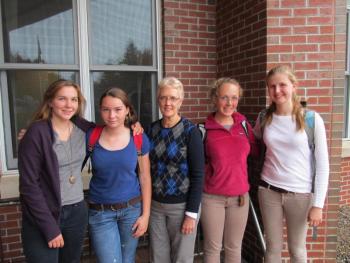 Audrey Lane, Frances Pendleton, Liz Dailey, Emily Haining and Emily Quinn. Not pictured, Sara Wandell. (Photo by Kay Stephens)
Audrey Lane, Frances Pendleton, Liz Dailey, Emily Haining and Emily Quinn. Not pictured, Sara Wandell. (Photo by Kay Stephens)
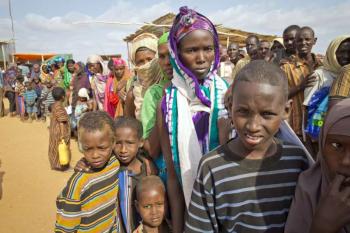 Newly arrived Somali refugees in Ethiopia in 2012. (Courtesy The UN Refugee Agency)
Newly arrived Somali refugees in Ethiopia in 2012. (Courtesy The UN Refugee Agency)
CAMDEN — Imagine having to leave your 8-year-old son alone in a country where warlords routinely kill and rape your neighbors, then seize their houses. Somali refugee, 26-year-old Khadija Hassan, had to make an extremely difficult decision five years ago when she and her husband gathered the rest of her five children to flee to America, eventually settling in Lewiston.
In the Somalian refugee camps, chances for resettlement are based on ration cards. It’s complicated to explain, but when Khadija’s son, Hussein, was 4, he was placed in his grandparents’ custody; therefore, under their ration card, not Khadija’s. Because of this discrepancy, when Khadija’s placement was randomly chosen, she could only take the children on her card.
The plan was always to send for Hussein once they got settled in Maine. But soon after they left, Hussein’s grandparents both died and he was then placed in his uncle’s care. While on their way to another refugee camp, his uncle was shot in his tent and had to be transferred to a hospital in Nairobi, leaving Hussein alone, once more. For the last five years, Khadija has been trying to raise the money to get her son back. Hussein has lived in a horror zone, displaced from his home, shuffled around in the Kakuma refugee camp, which has grown to nearly 500,000 refugees in 20 years. New refugees continue to arrive, but the Kenyan government has suspended full-scale registration. Without being registered, new arrivals cannot access all of the assistance to which they are entitled.
This is exactly Hussein’s predicament. Now 13, he continues to live on his own in a dangerous refugee camp in Kenya without the proper, updated documentation. The conditions of the refugee camp are chaotic and violent, according to a case worker familiar with Khadija’s plight. Aid workers have been kidnapped and sometimes murdered, along with attacks on security personnel. Refugees have been targeted for assassination. It’s a brutal world for an adult. One can’t even imagine the breaking point of this boy, with no parents and no home.
At the time of this article, attempts to reach Khadija and her case worker were unsuccessful. However, a small group of students at Camden Hills Regional High School have been working on Hussein’s behalf in an effort to bring him to the United States and to reunite him with his mother. The students include Audrey Lane, Frances Pendleton, Emily Haining, Emily Quinn and Sara Wandell.
“Emily Quinn told me about this and when she was describing the situation, I felt so sad for this boy,” said Lane. “When she came up with something we could do to help him, I wanted to join.”
Quinn learned about Hussein’s predicament from her mother, Donna Gates, a psychologist doing trauma treatment with Somali refugees.
“I thought how we could raise the money and get the funds together to bring him back here,” said Quinn.
She and her friends decided to raise $3,000 for his visa and travel expenses. They created flyers, donation jars and raffle baskets, then placed them in a number of area businesses. Among the many locals and businesses that helped, Zoot Coffee in Camden evenly matched every dollar donated.
Liz Dailey, a teacher at CHRHS who heads up the Amnesty International Club, offered to help the girls on her own time. (CHRHS doesn’t allow students to fund-raise for individual campaigns).
“They approached me as an adviser and I helped them put together the raffle baskets and showed them how to build awareness in a community,” said Dailey. “People would stop and ask questions about Hussein and the girls would explain what they were doing for him. I was drawn to it, because any time students are thinking outside of their own world view, it’s always inspiring to me. When Emily gathered some students together, I really wanted to support that.”
So far, the group has successfully met their goal to raise $3,000 to bring Hussein to the United States. The frustrating part is that even though the funds are there, the obstacle is getting someone to take Hussein’s photo and process the paperwork for his visa. Hussein is still living unescorted — essentially like an orphan — in the refugee camp.
“There’s no one who can help him or bring him to the United Nation’s office,” said Quinn.
His mother has had occasional phone contact with him over the years, according to Quinn. The last they knew of his situation, he had been living with some neighbors, but these neighbors may have already been relocated. To compound his problems, landowners and public officials who control the displacement camps often divert incoming aid, and children are also more often the victims of malnourishment.
“I feel so awful for him,” said Quinn. “I cannot imagine living in these conditions with warfare every day, with no family around,”
The girls and Dailey are hoping to expand more awareness for Hussein, not necessarily more funding, but to find a way to get someone like a United Nations employee to find Hussein and process his photo and visa paperwork so he can finally be reunited with his mother and family.
“Perhaps our next step is to get a letter campaign going,” said Dailey. “Maybe we can get help from Sens. Susan Collins and Angus King.”
Quinn nodded. “We’re just going to keep working to find a way to get him here,” she said.
If anyone wants to get in touch with Dailey or the students, the best email to reach them is liz_dailey@fivetowns.net
For more information, contact: Refugees International or The UN Refugee Agency.
Kay Stephens can be reached at news@penbaypilot.com
Event Date
Address
United States

